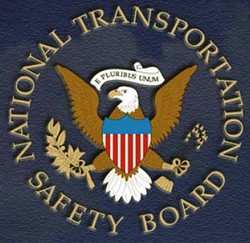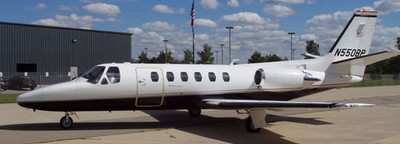Pilot Mismanagement And Improper Actions Found As Probable
Cause
 The NTSB determined
Wednesday that the probable cause of an aircraft that lost
control and impacted water was the pilots' mismanagement of an
abnormal flight control situation through improper actions,
including lack of crew coordination, and failing to control
airspeed and to prioritize control of the airplane.
The NTSB determined
Wednesday that the probable cause of an aircraft that lost
control and impacted water was the pilots' mismanagement of an
abnormal flight control situation through improper actions,
including lack of crew coordination, and failing to control
airspeed and to prioritize control of the airplane.
On June 4, 2007, about 1600 CST, a Cessna Citation 550, N550BP,
impacted Lake Michigan shortly after departure from General
Mitchell International Airport, Milwaukee, Wisconsin (MKE). The two
pilots and four passengers were killed, and the airplane was
destroyed. The airplane was being operated by Marlin Air under the
provisions of Part 135. The aircraft was carrying a human organ for
a transplant operation in Michigan. At the time of the
accident, marginal visual meteorological conditions prevailed at
the surface, and instrument meteorological conditions prevailed
aloft; the flight operated on an instrument flight rules flight
plan.
Due to the lack of a data recording system, the Board could not
determine the exact nature of the initiating event of the
accident. However, the evidence indicated that the two most
likely scenarios were a runaway trim or the inadvertent engagement
of the autopilot, rather than the yaw damper, at takeoff.
The Board further noted that the event was controllable if the
captain had not allowed the airspeed and resulting control forces
to increase while he tried to troubleshoot the problem.
By allowing the airplane's airspeed to increase while engaging in
poorly coordinated troubleshooting efforts, the pilots allowed an
abnormal situation to escalate to an emergency.
Therefore, the NTSB concluded that if the pilots had simply
maintained a reduced airspeed while they responded to the
situation, the aerodynamic forces on the airplane would not have
increased significantly. At reduced airspeeds, the pilots
should have been able to maintain control of the airplane long
enough to either successfully troubleshoot and resolve the problem
or return safely to the airport.
Contributing to the accident were Marlin Air's operational
safety deficiencies, including the inadequate checkrides
administered by Marlin Air's chief pilot/check airman, and the
Federal Aviation Administration's (FAA) failure to detect and
correct those deficiencies, which placed a pilot who inadequately
emphasized safety in the position of company chief pilot and
designated check airman and placed an ill-prepared pilot in the
first officer's seat.

N550BP
Results from the Board's investigation indicated that the
captain did not adhere to procedures or comply with regulations,
and that he routinely abbreviated checklists. Subsequently,
the NTSB concluded that the pilots' lack of discipline, lack of
in-depth systems knowledge, and failure to adhere to procedures
contributed to their inability to cope with anomalies experienced
during the accident flight. Thus, the Board also concluded that
Marlin Air's selection of a chief pilot/check airman who failed to
comply with procedures and regulations contributed to a culture
that allowed an ill-prepared first officer to fly in Part 135
operations.
The report adopted today by the Board, points out that FAA
guidance regarding appointment of check airmen requires Principal
Operations Inspectors (POI) to verify the check airman candidate's
"certificates and background." Additionally, all required training
must be completed, and the airman's training records must show
satisfactory completion of initial, transition, or upgrade
training, as applicable. The guidance does not specifically address
POI actions when the background evaluation discloses negative
information. This lack of guidance can result in the appointment of
check airmen who do not adhere to standards and who possibly
jeopardize flight safety.
As a result of this accident investigation, the Safety Board
issued recommendations to the FAA, and the American Hospital
Association regarding airplane and system deficiencies, FAA
oversight, and the safety ramifications of an operator's financial
health.
 ANN's Daily Aero-Linx (04.16.24)
ANN's Daily Aero-Linx (04.16.24) Aero-News: Quote of the Day (04.16.24)
Aero-News: Quote of the Day (04.16.24) Airborne 04.10.24: SnF24!, A50 Heritage Reveal, HeliCycle!, Montaer MC-01
Airborne 04.10.24: SnF24!, A50 Heritage Reveal, HeliCycle!, Montaer MC-01 Airborne 04.12.24: SnF24!, G100UL Is Here, Holy Micro, Plane Tags
Airborne 04.12.24: SnF24!, G100UL Is Here, Holy Micro, Plane Tags Airborne-Flight Training 04.17.24: Feds Need Controllers, Spirit Delay, Redbird
Airborne-Flight Training 04.17.24: Feds Need Controllers, Spirit Delay, Redbird




